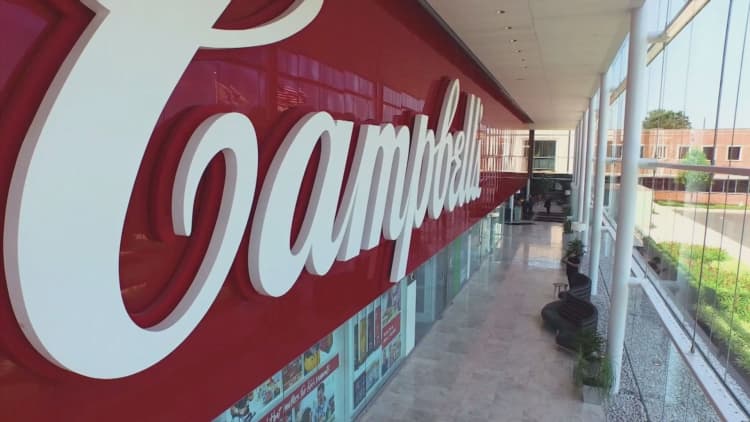
Campbell Soup is acquiring snacks company Snyder's-Lance for $4.87 billion in cash, the largest ever deal in the soup company's 148-year history.
CNBC had reported Friday that a deal, valued at $50 a share, was in the works.
Snyder's stock jumped 6.7 percent in Monday's premarket to $49.95 a share.
The deal underscores the drive for food industry consolidation as traditional food companies watch their sales drop and struggle to create growth or innovation on their own. It points to the opportunity they see in snacks, appealing to the increasing number of people who eat and shop on the go.
Campbell's stock, before news of its plans to acquire Snyder's broke, was down roughly 18 percent during the past year. Sales in its America's simple meals and beverages segment, which includes soup and V8 beverages, has declined on an annual basis since 2015. Sales in its global biscuits and snacks division, which include Pepperidge Farm Goldfish and Milano cookies, were up 3 percent in the most recent quarter.
Adding Snyder's snack brands like Diamond Foods and Pop Secret popcorn will broaden Campbell's snack business and create a stronger foothold into convenience stores.
"This acquisition will dramatically transform Campbell, shifting our center of gravity and further diversifying our portfolio into the faster-growing snacking category," CEO Denise Morrison said in a statement Monday morning.
Campbell's baked snacks generated roughly 31 percent of Campbell's sales in fiscal 2017. Adding Snyder's-Lance's snack brands will bring that proportion up to roughly 46 percent of Campbell's annual net sales. Campbell's soup brands — including its recent acquisition of Pacific Food organic soup — will now represent about 27 percent of the company's annual net sales.
The deal is the boldest in a series of smaller steps to move beyond its core soup business, as Morrison heads into her seventh year in the job.
Campbell acquired dressing, beverage and vegetable company Bolthouse Farms in 2012 for $1.55 billion. This month, it completed its $700 million acquisition of Pacific Foods. Last year, it joined the ballooning number of consumer packaged giants to launch a venture unit in hopes of keeping closer tabs on innovation.
Pressure on Big Food to do larger deals that can make a more immediate impact has heightened over the past year. Beyond slowing sales, food companies are working with increasingly punishing retailers that are under their own pressure as shoppers pick up their food staples at convenience stores and, increasingly, Amazon. To stay relevant, grocers have focused on fresh food to bring shoppers into their stores.
America's snack habit
Even as U.S shoppers are eyeing fresh foods, they continue to swoop up snacks in their corner store, in the airport or on their way to the office. The U.S. snacking market is worth roughly $89 billion, according to IRI, and growing at a compound rate of nearly 3 percent.
Just within the past couple of months, Kellogg announced its $600 million acquisition of RXBar, Conagra Brands scooped up the parent company of Angie's Boomchickapop popcorn and Mars invested in the parent company of Kind Bar.
On Monday, Hershey announced plans to acquire SkinnyPop parent Amplify Snack Brands for about $1.6 billion.
Campbell has been doubling down on its own snack business. It plans to broaden the appeal of its Goldfish crackers to older snackers and earlier this year rolled out out its Pepperidge Farm Farmhouse Thin & Crispy cookie. The latter gave the soup company a chance to hop on other consumer trends, like snacks with fewer ingredients and clearer labels.
Snyder's-Lance has been gobbling up snacks nearly since its inception. Snyder's of Hanover was a pretzel company that originated in 1909. Lance was a roasted peanut company started by Philip Lance in 1913 that soon thereafter introduced its peanut butter cracker sandwich. The two combined in 2010. They bought Diamond Foods — owner of Kettle chips and Pop Secret — in 2016.
It has struggled recently though with operational challenges, including a more costly than expected integration of its Diamond acquisition.
Meanwhile, its "direct store delivery" model — in which it delivers directly to stores — has proven costly and out of step with today's more popular warehouse model. Direct store delivery becomes more cost efficient as more products are added to the system.
Earlier this year, Snyder's CEO Carl E. Lee Jr. stepped down from the role after working at the company for 12 years. He was replaced by Brian Driscoll, former president and chief executive of Diamond Foods.
Credit Suisse acted as lead financial adviser to Campbell, which was also advised by Rothschild. Weil, Gotshal & Manges acted as Campbell's legal counsel.
Goldman Sachs acted as lead financial adviser to Snyder's-Lance. Deutsche Bank has also acted as long-time financial adviser to Snyder's-Lance. Jenner & Block acted as legal counsel to Snyder's-Lance.


